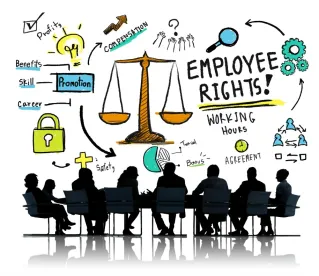One would think that with everything we know today, and the age of the internet, situations where offensive jokes, name-calling, sexual contact, slurs, intimidation, or even mockery would not be an issue, but it’s as alive as ever before. With our focus on the most recent sexual misconduct allegations and bias on a woman in any position, how could this be?
It goes without saying that there have always been “unwritten” rules within any and every company, however, when an incident occurs, which is to blame? The harasser or the company? How was it handled? Is there a system in place? Who is liable if someone decides to sue?
Of course, as an attorney, you know the answer is, “it depends.” But let’s get to the basics before we start picking apart any one particular situation.
Being a bystander can no longer be an action blamed on ignorance. It shouldn’t take a #metoo campaign to open the eyes of all citizens in the United States, and everywhere else in the world. These grotesque situations are plastered all over every platform from social media to the news, yet, they occur every day in different environments while others sit and ignore the signs.
If you think you do not need to evaluate behaviors and practices in your law firm because everything is fine, you need to let your complacency be a warning sign.
Just because you don’t see sexual harassment occurring, that doesn’t mean it does not exist. In fact, if there’s anything that the scandals recently taking over the news have indicated, it’s that the most damaging and vitriolic instances of sexual harassment can go unnoticed for extended periods of time. The potential for inappropriate behavior in a law firm is considerable, for many reasons. According to the U.S. Department of Labor, only thirty-five percent of practicing lawyers are women; by comparison, the percentage of women serving as paraprofessional and support staff is enormous. These statistics reveal a power dynamic in law firms defined by men in supervisory positions over women, which is a tried and true recipe for sexual harassment.
According to experts who have studied the issue and surveyed law firm employees, seventeen percent of female attorneys and twelve percent of support staff have been sexually harassed in the past year. Of those victims, six out of ten took no action out of fear of personal or career-related retribution. In many cases, the harasser was also a mentor of the victim, creating even more of a dysfunctional dynamic. This speaks to the imbalance of power inherent in a majority of instances of workplace sexual harassment; all too often, the victim is silenced for fear of having any adverse ramifications backfire on themselves instead of their harasser.
Another factor contributing to the high rate of sexual harassment in law firms is the mistaken impression that lawyers are somehow above the law. Because lawyers have a higher level of education on these issues, they can often engage in the inappropriate behavior despite the belief that they are “too smart” to ignore the rules. Similarly, victims may hesitate to report harassment because they work in a law firm; if someone steps over the line, someone in the firm will address it, right?
Harassment takes on many forms within a law firm. A quick Google search yields countless tales of behavior that is just totally unacceptable in a law firm or any other work environment. Professionals experiencing harassment have reported conduct ranging from a superior rubbing the victim’s shoulders in the middle of a meeting, to bringing a female associate to a hearing and telling her to dress provocatively to distract the judge or opposing counsel, to making crude innuendos about a co-worker’s body and their personal sex life.
It is crucial to remember that, although workplace sexual harassment is disproportionately directed against women, anyone in any workplace could be susceptible to unwelcome advances, remarks, or actions and is entirely entitled to seek out resources to address any harassment they might experience. It is also important to remember that witnessing sexual harassment and ignoring it means you are condoning the problem and, consequently, complicit in its continuation–especially if you know what you are seeing is undeniably over the line. So what can you do to confront and reduce sexual harassment in your law firm?
Here are a few best practices designed to minimize the risk of harassment:
-
Create a Clear Sexual Harassment Policy
There is no excuse for a law firm not to have a comprehensive sexual harassment policy, regardless of the size of the firm. By establishing clear and unambiguous standards of conduct, you will be well-positioned to take action if needed. Having a clear outline of your firm’s sexual harassment policies is also the best way to be proactive about protecting your employees from experiencing uncomfortable, or even dangerous, situations in your workplace. A firm that prioritizes their employees’ safety and well-being is bound to have a considerably higher degree of company morale than one that makes minimal or no efforts to do so.
-
Provide Mandatory Training for all Employees
We’re talking about real training, not some VHS tape made in 1983. Real sexual harassment training should cover all of the more nuanced situations that take place in day-to-day interactions, and it should take care to ensure that employees remained active and engaged throughout, ensuring that the information is taken in by all who undergo it. This can be done via gamification, a discussion panel-style gathering, or requiring the completion of questionnaires or quizzes to move along the training. Comprehensive training will not only help prevent employees from misbehaving but will also let potential victims know when to report inappropriate conduct.
-
Establish an Open-Door Policy for Victims
Victims need to know they can talk to someone about potential harassment both confidentially without fear of retribution. If your firm is large enough, have a team of three people (at least one of whom is a woman) meet with anyone who has a potential harassment claim. It is imperative that victims of sexual harassment be met with compassion and understanding when they decide to come forward, whatever the resulting course of action might be.
-
Objectively Evaluate Your Company Culture
Acknowledging your work environment may not be what you believe it to be can be tough because nobody likes to admit it when they make mistakes. But the only way of finding out whether you are part of the problem is to take a long hard look at your company culture and identify potential problems. If you are not able to evaluate yourself objectively, do not be afraid to seek outside counsel for help. If there are problems, focus on fixing them instead of making excuses for past failures. The priority is that all employees within the company, regardless of age, race, sexual identity or orientation, disability, or genetic information feel supported and protected by their employer, even if securing this assurance means revising existing company policies and procedures.
-
Take Swift and Decisive Action
Your sexual harassment policy should define the proper steps to take when someone files a complaint. It is crucial that you follow those steps without deviation, not only to protect yourself but also to let everyone in the firm see you take harassment seriously. It is easy to stress the ideological importance of protecting employees from distressing or dangerous interactions and situations. However, acknowledgment is not enough; action must be taken immediately, intelligently, and firmly following harassment claims to show employees that, when it comes to their well-being, your firm will put its money where its mouth is.
-
Lead by Example
The prevention of sexual harassment in any workplace must begin at the top. If you or any other partners are exempt from the documented course of action and policies following any harassment allegations, you are telling everyone that the rules don’t apply to you. Not only does this undermine your credibility with potential victims, but others will believe that once they reach a certain level, the rules don’t apply to them either. Power is not given to be abused, and it must be evident to all employees that authority will not be taken advantage of, at any level, at the expense of their safety and comfort.
Conclusion
Sexual harassment in the legal field is a real problem that people are finally starting to address, but the topic is a difficult one for numerous reasons. However, a professional who’s made it through the LSAT, law school, and bar examinations knows better than virtually anyone else that difficulty is no excuse for complicity. Instead of trying to avoid or skirt around the issue, be proactive and address it professionally, thoroughly, and responsibly. Nobody should be made to feel uncomfortable or unsafe where they work, and it is first and foremost the responsibility of an employer to establish a safe environment within their firm. It’s that simple.




 />i
/>i
